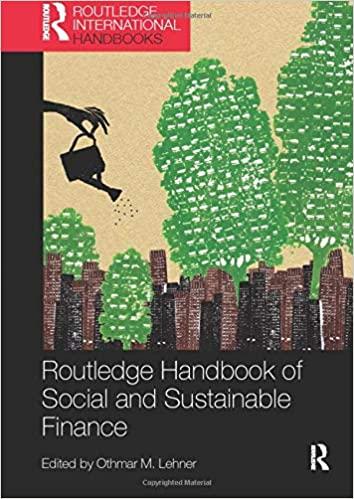Question
Ethical Dilemma DRIP, DRIP, DRIP . . . Should We Call a Plumber? Freeman Plumbing Supplies has decided to reexamine its existing dividend policy, which
Ethical Dilemma DRIP, DRIP, DRIP . . . Should We Call a Plumber? Freeman Plumbing Supplies has decided to reexamine its existing dividend policy, which was established 30 years ago when the firm first started paying dividends. Freemans operations have changed significantly during the past 30 years, so the CEO wants to determine whether its dividend policy is still appropriate. The CEO suggested that tit might be a good idea for the firm to begin a dividend reinvestment plan (DRIP) because he believes that the company is a good investment and that most of the firms stockholders would prefer to have their dividends reinvested in the companys stock rather than paid to them in cash. As a result, Ed Davidson, one of Freemans most experienced financial managers, was assigned the task of evaluating the feasibility of starting a DRIP program. It is Eds opinion that Freeman should pay dividends to maintain its market value and, thus, also maintain stockholders wealth. Since the tax rate on dividends was lowered a few years ago, most companies in Freemans industry have either increased their dividends or started paying dividends for the first time. So Ed is convinced that Freeman must continue to pay dividends; in fact, he thinks that the amount of dividends should be increased. When Ed was assigned the task of evaluating the possibility of starting a DRIP program, he was excited. He knew that the program would be administered in his department, which would give him and his colleagues a chance to showcase the quality of work they perform. As his evaluation progressed, however, Ed started to get concerned that the CEO had a personal ulterior motive in mind when he suggested the DRIP program. Eds concerns increased when he found out that Freemans executives receive huge bonuses each year that are normally paid in the form of the companys stock. His research indicates that a DRIP program would permit executives to receive their bonuses in the form of dividends that are reinvested in companys stock, which would have the same effect as the existing bonus-payment system. However, because they actually receive a dividend payment, the executives would be taxed differently if their bonuses pass through a DRIP program. If executives are paid their bonuses using the existing plan, any stock they receive is taxed at the same rate as their ordinary, or regular, income, whereas qualified dividends are taxed at lower rates. In other words, stock that is purchased through a DRIP plan qualifies as a dividend payment that would be taxed at a more favorable rate than ordinary income. With the additional information that he has collected, Ed is concerned that the CEO wants to initiate a DRIP program only because it will be beneficial to Freemans executives. Although Ed is still in the beginning stages of his evaluation, he doesnt think the company should initiate programs just because they benefit executives. At this point, Ed is trying to decide whether he should abandon his evaluation and tell the CEO to go jump in the lake or continue with an evaluation that might give the CEO the justification he needs to start a program that will benefit top management. What should he do? What would you do if you were Ed? Discuss and support the analysis by incorporating factors that firms consider when making dividend policy decisions. Your initial forum response, due on Wednesday, will be 200 words
Step by Step Solution
There are 3 Steps involved in it
Step: 1

Get Instant Access to Expert-Tailored Solutions
See step-by-step solutions with expert insights and AI powered tools for academic success
Step: 2

Step: 3

Ace Your Homework with AI
Get the answers you need in no time with our AI-driven, step-by-step assistance
Get Started


